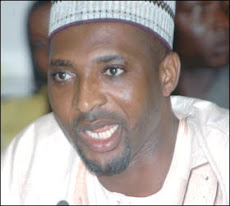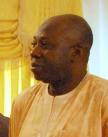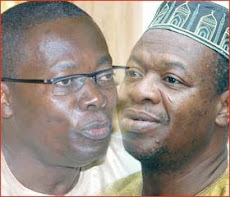Speaking at the second anniversary lecture in memory of the late nationalist, Chief Michael Adekunle Ajasin in Akure, Ondo State, Soyinka said: "I challenge President Olusegun Obasanjo to use his anti-corruption crusade in repatriating our monies looted by the military regimes and the money given to President Rawlings who joined hands with General Abacha in embracing the culture of corruption which has tainted Nigeria as a nation."
Just last month, June 2009, There were calls on the Governor of Rivers State, South-South Nigeria, Mr. Rotimi Amaechi to account for how his administration spent appropriated funds totalling over Five Hundred Billion Naira about $3.6billion in the last two years.
According to credible sources, part of the money that Amaechi is struggling to reconcile in the books may have actually gone into providing funds for the ruling party in Ghana, an alleged contribution to the election of incumbent Ghanaian President, John Atta Mills.
A whopping Four Hundred Million, about $3.5 million was allegedly transferred to facilitate the process in Ghana. Former Ghanaian dictator, Flight Lt. Jerry John Rawlings (Retired) has been identified as the alleged conduit through which the huge sums were transferred to the ruling party in Ghana. Rawlings had been a regular visitor to RiverState.
During the last Ghana election, Rawlings got upset because one Victor Smith has directed a NIGERIAN financier who wanted to give money to Rawlings for NDC campaigns, but Victor Smith told the Nigerian to give it to the MILLS campaign team. This made Rawlings to fire Smith by text message, telling him to seek employment at the MILLS campaign team.
One Ghanaian said: “THEY ARE ALL THIEVES. Rawlings killed people for borrowing fifty thousand cedis and yet this idiot is running around the world coning people”.
On Friday 17 July 2009, Mabey and Johnson, a UK based company pleaded guilty at Westminster Magistrates Court in London, UK, to ten charges of corruption relating to contracts in Ghana, Jamaica and Iraq between 1993 and 2001.
The international bridge building firm is accused of seeking to corruptly influence politicians and officials in Ghana between 1994 and 1999 to land build-bridging contracts.This bribery allegation was allegedly linked with JJ Rawlings and his government.
Five of the firm's eight directors have already resigned their positions as a result of the UK Government's investigations into a range of alleged corrupt practices by this company, including dealings with Saddam Hussein in Iraq in breach of UN sanctions.
Today, the NDC - Ghana's ruling party, (JJ Rawlings party) is doing all they can to suppress this story in Ghana (widely reported in Ghana’s STATESMAN, through information fed them by a friend of mine here in the UK). One Ghanaian Newspaper wrote: Former President Rawlings has always used the slightest opportunity to preach the virtues of instilling probity, accountability, integrity and ethics into Ghanaian politics.
But this case of a British Company A little-known family who became one of the richest in Britain - accused of making excessive profits, by building what their critics call "bridges to nowhere", charged with corruptly influencing Ghanaian politicians and officials between 1994 and 1999 to gain bridge building contracts in Ghana, is a sudden twist of events.The first major British company to be prosecuted for paying bribes abroad for contracts awarded.
The paper continues: The history of bribery among NDC officials is legendary. In 2002, the former Managing Director of Ghana Rubber Estates Limited (GREL), Mr. Etienne Arthur Marie Popeler told an Accra Fast Track Court that he gave monies to Dan Abodakpi, the former Minister of Trade and Industry, Sherry Ayittey, Treasurer of the 31st December Women’s Movement and Mr. Emmanuel A. Agbodo, (former Executive Secretary) of the Divesture Implementation Committee (DIC) under the previous NDCAdministration to influence the divestiture of GREL.
The 51-year old Belgian said he paid $1 million bribe to the 31st December Women’s Movement (31st DWM), an NGO run by Rawlings’ wife, for his French company SIPH to secure GREL. Sherry Ayitey is back under the Mills-administration as Minister for Environment and Science.Another bribery and corruption scandal hit the Rawlings administration in 1995/96 when CHRAJ conducted investigations into allegations of corruption and illegal acquisition of assets made against four ministers of state and some senior government officials.
The case involved Col E.M Osei-Owusu (Rtd), a former Minister of the Interior; P.V. Obeng, Presidential Staffer, Ibrahim Adam, Minister for Agriculture and two others from the Agriculture Ministry and Adjei Marfo, Chief executive officer of a state owned company.
The Commission made adverse findings against the three of the officials and exonerated one for lack of evidence. Rather infamously, the government presided over by President Rawlings at the time issued a White Paper contesting the findings made by the Commission.
“To the outside world, Rawlings maybe a hero, but to us Ghanaians, he is a crook”, one Ghanaian Insisted. To my question: “is Ghana’s successful democracy because of Rawlings or in spite of him”? He said, “Rawlings despises democracy, but as a result of local and international pressure he had no choice but to step aside”.
Towards the end of Rawlings reign, Ghanaian economy was reeling under heavy debt, high inflation and large budgetary deficit. Ghana needed IMF/World Bank Loan to survive. (Even till date, a large chunk of Ghana Budgetary needs is still met through international aid). Rawlings was told in no uncertain terms, that Ghana must democratise.
Immediately after Obama’s speech to Ghanaian Parliament, Rawlings was interviewed by Komla, a journalist. Mr. Rawlings who has become known as the accuser of everyone else except himself, said Ghana’s strides in democracy was nothing to write home about. When given the opportunity by Komla to shed some thoughts on the visit of President Obama, he used the opportunity to lambast everyone from President Mills to Ex-President Kuffour. The Western countries from George Bush to Tony Blair were not left out.
During 'Ghana Decides 08' when Baroness Amos from Britain led a Commonwealth delegation to his house, He lambasted everyone and even questioned the essence of democracy.
When Rawlings gave a speech at Oxford this year, he questioned the use the rule of law and principles of democracy in governance.
Of course, a man that overthrew a constitutional government in 1981- which is treason; murdered military leaders and generals without due process of law; killed three civilian high court judges and engaged in rampant corruption must have no regards for constitutional rule.
Today, there is stable democracy in Ghana, but that is in spite of JJ Rawlings and not because of him. Ghanaians know what they went through to get where are currently.They also know that the reality in Ghana is not exactly as portrayed by the outside world.
Those that actually follow events in Ghana know that elections are still marred by violence. Violent crime is endemic. Drug gangs are on the prowl and corruption is widespread. But their military have been severely weakened and kept busy by peace keeping activities outside the shores of Ghana – especially during Kofi Annan’s tenure as the UN Secretary General.
Moreover, Ghana is essentially a peace-loving Nation; their Hausa/Muslim population is a minority and thus kept in check. There is healthy rivalry between the major ethnic groups.
To the proponents of a ‘JJ Rawlings’ for Nigeria, my question is this:
Let us suppose Sani Abacha had killed Moshood Abiola, then went ahead and killed Olusegun Obasanjo and Oladipo Diya, then annihilated Babangida and Buhari for their later day opposition to his antics, sprinkled in the killing of some opposition Supreme Court Judges and courageous journalists.
Meanwhile he had killed Musa Yar’Adua, Rewane, Kudirat and Ken Saro Wiwa. He then proceeded to get himself nominated by his “5 fingers of a leprous hand” political parties in 1998 as their consensus presidential candidate and “won” an election against himself.
Let us also suppose that in 2009, ten years after, a combination of local and international pressure, fed by mass demonstrations and fightings for democracy eventually forced him aside. Then Afterwards, Nigeria insists on democracy that lasted for the next decades, no matter how imperfect; Would you consider Abacha a hero or a villain?
A revolution is needed in Nigeria, but not a bloody revolution. Rather than waiting for “our own JJ Rawlings”; Rather than indirectly inviting another military coup - yes that is what it is, all those advocating a bloody revolution are, just cowards that refuse to acknowledge that they are indeed wishing for a military coup -We need a strong and organized civil populace, we need a transparent and independent judiciary that can stand up to our governments and bring justice to our people.
We must be very careful of what we wish for, lest it come back to haunt us! The events of 1993 is enough warning!
So what do you, think? Rawlings, hero or villain, join the debate here
Read also Africa, Strong Institutions versus Strong Men
and Nigeria Needs Strong Institutions Not Strong Men
Written by Daniel Elombah
elsdaniel@yahoo.com














No comments:
Post a Comment